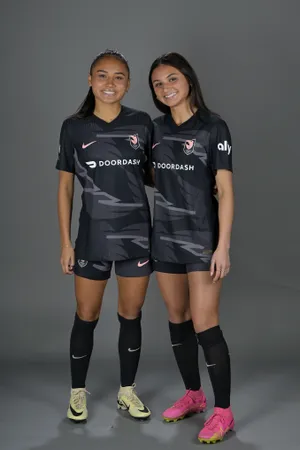Teen soccer sisters stack up mogul-like résumé: USWNT, movie cameo, now a tech investment

Taking the traditional path has never much interested Alyssa and Gisele Thompson.
They were the first high school athletes to sign an NIL deal with Nike. Alyssa was the first high schooler to be the No. 1 pick in the NWSL draft, by Angel City FC, while Gisele signed with the team as a free agent when she was still in high school.
They’ve already made a cameo in a movie with Jennifer Garner, and last week announced they were becoming stakeholders in TOCA Football, a network of training facilities that relies heavily on technology for player development.
All this, and the Thompson sisters are still teenagers. Alyssa, a forward on the United States' World Cup team last summer, turned 19 in November. Gisele, a defender who played at the Under-17 World Cup in 2022, celebrated her 18th birthday a month later.
“It’s always been about being more than just soccer. We don’t really want to see ourselves as only soccer players,” Gisele said.
The NIL deal with Nike was "our first thing," Alyssa added, "and we were like, 'Wow. We could actually step outside the realm of soccer a little bit.'"
The Thompsons are not the first teenage athletes turned budding business moguls. Serena Williams signed with Puma at 16. At 19, Coco Gauff’s portfolio of sponsors range from athletic wear to pasta to package shippers.
Opinion:Complete debacle against Mexico is good for USWNT in the long run
But being able to use sport as a gateway to opportunities beyond it, in business and otherwise, this early in a career used to be reserved for tennis players and Olympians. Being able to build a brand that can sustain someone long after their athletic career is finished used to be reserved for male athletes.
That the Thompson sisters are doing both now reflects their talents as well as the changing landscape for athletes. Female athletes in particular.
Abby Wambach has talked about receiving the ESPY Icon Award alongside Peyton Manning and Kobe Bryant and realizing as they walked off stage how different their fortunes were — literally and figuratively — even though all three had been at the pinnacle of their sports.
“I didn’t have much to show for it financially,” said Wambach, a World Cup champion, two-time Olympic gold medalist and, for a time, the all-time international scoring leader.
“Their biggest concerns were how they were going to invest their hundreds of millions of dollars that they rightfully earned,” Wambach added. “And mine was … how I was going to find a job, to get health insurance, to be able to pay my mortgage that month.”
But thanks to NIL, and the skyrocketing interest in women’s sports, there are more opportunities than ever for female athletes. And they don’t have to wait until they’re veterans to capitalize on them.
“We’re always so grateful and thankful because we wouldn’t be in this position without the players before us and what they did to build it up to where it is now,” Alyssa Thompson said. “We can still grow it a lot more and try to reach for where the men are. But it’s definitely super cool that we get to have these opportunities.”
As they’ve begun building their “brand” outside soccer, the Thompsons have gotten advice from family members. The best has been to stay true to themselves, aligning with companies and brands they already use or they’ve admired.
They wore Nike gear growing up, so that was a no-brainer, they said. They trained at TOCA when they were in grade school, too.
TOCA facilities are similar to tennis or golf clubs, with spaces to train and socialize. But the Thompsons said what they appreciated from their time at TOCA was the technology the club uses to measure a player’s performance.
Even those who are just starting out.
“Right after you’re done, you get your stats,” Gisele Thompson said.
Added Alyssa, “I think it helped us with our awareness, that you don’t really pick up when you’re that young. You’re just like, 'I’m just on the field, running around.' But really, when you’re in TOCA, you have to be aware of so many different things, so having that was really helpful to our development.”
The sisters moved on to Total Futbol and eventually played on the club’s Under-19 boys team, which is part of MLS Next, the league’s feeder system. Both were stars in the U.S. youth system and are expected to be cornerstones of the USWNT for the next decade. Or more.

But the Thompsons want to be more than soccer stars. Both have interests outside of the sport — Gisele “loves to bake” — and they have friends who don’t care about soccer, let alone play it. They want their business interests to reflect who they are as both athletes and people, knowing their careers after soccer will last much longer than their time as players.
And by starting now, when their professional careers are just beginning, they hope to have the kind of choices after they’re done playing that have long been a given for star male athletes.
“It’s super important for us to do that,” Alyssa Thompson said. “We’re so young in our careers and it’s hard to think about what we want to do after. We want to be financially stable. With everything that has come our way, we just want us in the future to be OK with the decisions we made before.”
Because those decisions could have a lasting impact, for the Thompsons and female athletes who come after them.
Follow USA TODAY Sports columnist Nancy Armour on social media @nrarmour.
Disclaimer: The copyright of this article belongs to the original author. Reposting this article is solely for the purpose of information dissemination and does not constitute any investment advice. If there is any infringement, please contact us immediately. We will make corrections or deletions as necessary. Thank you.







